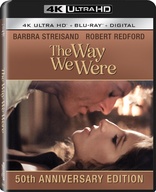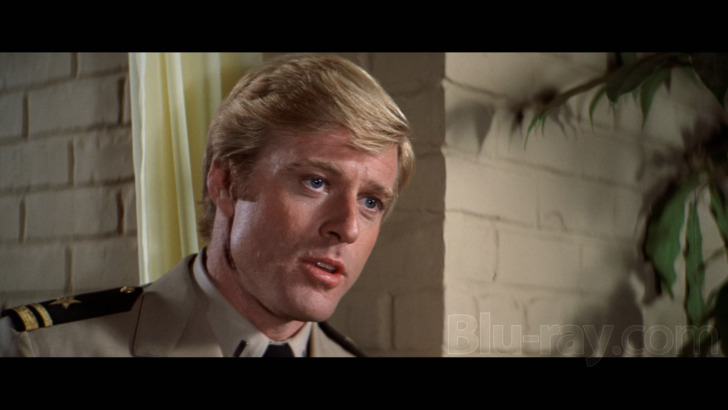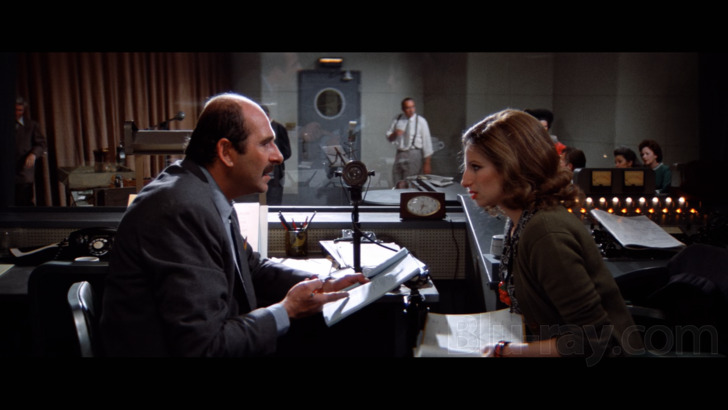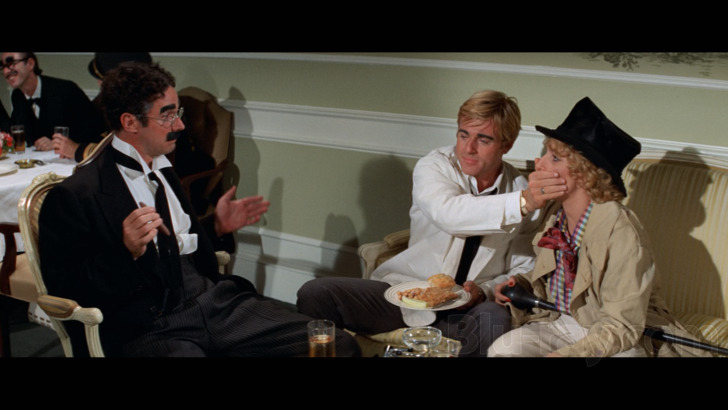The Way We Were 4K Blu-ray Movie
HomeThe Way We Were 4K Blu-ray Movie 
50th Anniversary / 4K Ultra HD + Blu-ray + Digital CopySony Pictures | 1973 | 1 Movie, 2 Cuts | 123 min | Rated PG | Oct 17, 2023

Movie rating
7.1 | / 10 |
Blu-ray rating
| Users | 0.0 | |
| Reviewer | 4.0 | |
| Overall | 4.0 |
Overview
The Way We Were 4K (1973)
Two desperate people have a wonderful romance, but their political views and convictions drive them apart.
Starring: Barbra Streisand, Robert Redford, Bradford Dillman, Lois Chiles, Patrick O'Neal (I)Director: Sydney Pollack
| Romance | 100% |
| Drama | 49% |
Specifications
Video
Video codec: HEVC / H.265
Video resolution: 4K (2160p)
Aspect ratio: 2.35:1
Original aspect ratio: 2.39:1
Audio
English: DTS-HD Master Audio 5.1
English: DTS-HD Master Audio 2.0 Mono
Subtitles
English, English SDH, French, Spanish
Discs
Blu-ray Disc
Two-disc set (2 BDs)
Digital copy
4K Ultra HD
Packaging
Slipcover in original pressing
Playback
Region free
Review
Rating summary
| Movie | 3.5 | |
| Video | 4.5 | |
| Audio | 3.5 | |
| Extras | 3.5 | |
| Overall | 4.0 |
The Way We Were 4K Blu-ray Movie Review
"Wouldn't it be lovely if we were old? We'd have survived all this..."
Reviewed by Kenneth Brown November 18, 2023Take a moment and scan the American Film Institute's list of 100 Greatest Love Stories. The Way We Were ranks sixth, behind the likes of Casablanca and Gone with the Wind, narrowly edging out Doctor Zhivago. Its titular song, sung by lead actress Barbara Streisand, sits at number eight on AFI's Greatest Movie Songs. Suffice to say, The Way We Were boasts real cinematic clout. That much is undeniable. But let's step away from the film itself and ask a larger, perhaps more pertinent question: how much should a film's longevity or universality -- its ability to speak to modern audiences years after its initial release -- factor into its 21st century value? TWWW is, from every angle, a product of yesteryear; a movie that may have delighted in the '70s but has aged less than spectacularly. Its pacing has become sluggish in the ensuing decades. Its romance less of a star-crossed saga and more of a descent into the inevitability of sociopolitical separation. Is it still relevant? In a world of MAGA vs. Wokism, sure. But even in that context the film barely scratches the surface of the things that disrupt relationships and hinder love. What remains is a somewhat saccharine glimpse into the past, when movies were slower, stories were simpler, and principles were more easily defined.

Told partly in flashback, 'The Way We Were' is the story of Katie Morosky (Barbra Streisand) and Hubbell Gardiner (Robert Redford). Their differences are immense; she is a stridently vocal Marxist Jew with strong antiwar opinions, and he is a carefree White Anglo-Saxon Protestant with no particular political bent. While attending the same college circa 1937, she is drawn to him because of his boyish good looks and his natural writing skill, which she finds captivating, although he does not work very hard at it. He is intrigued by her conviction and her determination to persuade others to take up social causes. Their attraction is evident, but neither of them acts upon it, and they lose touch after graduation. As the two would-be lovers reconnect over the years, increasingly put at odds by political beliefs and cultural convictions, they find their budding love threatened by their principles, leaving them with a difficult choice between love and purpose.
There's a quintessential throwback romanticism to The Way We Were's tale of two people who can never quite figure out how to make things work. Colliding every few years, sometimes with sparks of passion, sometimes terribly disappointing one another to increasingly disheartening ends, Katie and Hubbell are all at once a couple to root for and a couple you come to wish would hurry up and see the writing on the wall. Doctor Zhivago is a clear influence on Arthur Laurents's novel and subsequent screenplay, but whereas Zhivago's Yuri and Lara are kept apart by very real, very tangible wars (WWI and the Russian Civil War), Katie and Hubbell are at odds with ideas... politics... religion. It's meant to be a more nuanced examination of love on the rocks but it's one that seems more surmountable, if either party were simply to let a few things go. The fact that the two are at such extremes, especially when it comes to such volatile and important issues, isn't the irritation. The fact that they keep trying in spite of it all becomes more than a passing problem. It doesn't help that Hubbell's "extreme" is mere indifference; a breed of apathy that makes it difficult for him to care as deeply as Katie. But I kept wondering, would any growth from him help beyond a certain point? Could he ever catch up with Katie, who's off and running in her discourse and hot-buttoning long before he even gains an inch of ground? Worse, other than Redford's smolder and good looks, what in the world does Streisand's activist see in him? Way never quite tells us, nor sells us, nor convinces us in a manner that might satisfy the modern moviegoing mind.
Does it make for a bad film? Goodness no. But it does come down to mileage. Can you switch off fifty years of history and societal change to enjoy something patently outdated and, in hindsight, arguably superficial? If so, a love of Pollack's direction, Streisand and Redford's semi-stock '70s romantic performances (some may call it nostalgic), and the trappings of the era will be more than enough. For those like me, who struggle with palpably feeling a film's age as it unfolds, The Way We Were couldn't overcome its wrinkles, liver spots and bad knees. Classics like All the President's Men (yes, yes, I know... not a romance) fully stand the test of time, offering a deeper understanding of the politics, culture and challenges of its era while tackling significant topics and historic events, in spite of being dressed up like a more user-friendly political thriller. It's tough. It's not as if filmmakers have a crystal ball with which to determine the staying power of their stories. Some stand tall decades after the fact, some begin to fade, losing their luster, offering, at best, a glimpse into what moved audiences fifty years ago rather than what might draw two people like Katie and Hubbell closer together.
The Way We Were 4K Blu-ray Movie, Video Quality 

Regardless of whether you choose to watch the 118-minute theatrical cut or 123-minute extended version of The Way We Were (both are
available on a single 100GB UHD disc via seamless branching), one thing will become immediately clear: Sony has produced a remarkable remastering
of the film, presenting both cuts with a terrific 2160p 4K video presentation that honors director Sydney Pollack's intentions and cinematographer Harry
Stradling Jr.'s vibrant photography. A fine veneer of filmic, largely consistent and natural grain graces the image, rarely interfering with detail. Edges are
clean and textures are exacting as well, with only a handful of scenes that exhibit notable softness (most of which appears to trace back to the source
rather than a fault of the encode). Keep in mind, though, this is an early '70s production, shot without the benefit of digital cameras, so that's all to be
expected. Thankfully there isn't much in the way of garish tinkering or artificial sharpening... at least not of the noticeable variety, because all the
wizardry of a modern remaster has certainly been put to work here. Colors are striking, and it might surprise newcomers to see just how punchy the
primaries can be. This is no lush, golden-hour romance. The palette is more convincing and lifelike, as are skintones (minus a few outlier shots where
faces struck me as a touch too warm). And HDR bolsters the image as advertised, with richer hues and more remarkably vivid contrast. It only helps
that artifacting, banding and other anomalies are nowhere to be found. Sony continues to properly honor and restore their catalog classics,
reinvigorating most titles rather than simply tossing a film on a 4K disc for an easy upscale.
(Note: some members have reported a distracting and extended "hitch" and/or shudder in the image, apparently around the time when the 100GB disc
transitions to its third layer. I didn't detect any such issue, but I felt it was wise to still mention it.)
The Way We Were 4K Blu-ray Movie, Audio Quality 

There's not as much to get excited about when it comes to the two lossless audio tracks available for The Way We Were: a decent DTS-HD Master Audio 5.1 surround track with the extended edition of the film and a solid DTS-HD Master Audio 2.0 mono mix with the theatrical cut. Both are quite faithful to the original sound design and, thank God, the 5.1 track doesn't try to overstay its welcome. The addition of rear speaker activity and low-end output are tastefully done, and much more subtle than not. It does create a slightly more immersive soundscape, though there's an air of artificiality to it all (like so many in this vein) that never quite won me over. I much preferred the lossless presentation of the original mono audio, despite the fact that more modern film fans may find its flatness and relative thinness to be a hinderance to their enjoyment. Whichever you choose, dialogue is clear and well-prioritized, with the usual 70s-era quirks and shortcomings, albeit none that rise to the level of a problem. Music is neatly threaded into each track as well and doesn't overwhelm conversations or drop too low for its own good. All told, there's nothing really to complain about here. If you love 1970s cinema, you probably already know exactly what each of the film's audio tracks will sound like. And I won't fault Sony's 4K release or remastering efforts for that.
The Way We Were 4K Blu-ray Movie, Special Features and Extras 

- Extended Cut (4K HD, 2:02:45) - Of most interest to fans will be the film's newly minted extended edition, which runs approximately five minutes longer than the theatrical cut, both of which are presented on the same 4K UHD disc via seamless branching. The only possible downside is that the DTS-HD Master Audio 2.0 mono track can only be engaged when watching the theatrical cut, but I hardly think that counts as an issue.
- Audio Commentary (Theatrical Cut Only) - Director Sydney Pollack's informative archive audio commentary is included, offering a breezy, thoughtful recollection of the production, stories of working with powerhouses like Redford and Streisand, bringing balance to the film's multi-year plot, striking the right romantic tone and other anecdotes.
- Looking Back (SD, 62 minutes) - Ported from the 1999 DVD, this hour-long production documentary has a string of interviews, bits of deleted scenes and outtakes, and candid takes on the debate over scenes removed from the film's theatrical cut.
- Theatrical Trailer
The Way We Were 4K Blu-ray Movie, Overall Score and Recommendation 

I had a bit of a hard time with The Way We Were. It's not exactly my cup of tea, nor has it aged as gracefully as I'd hoped. Still, it has its charms and it certainly has its fans, so perhaps take my take with a grain of salt. That said, there's very little to complain about when it comes to Sony's 4K Blu-ray release. An excellent remaster, a strong video presentation, solid lossless audio mixes, both the theatrical and extended cuts, and a nice complement of special features makes this one an easy one to recommend to anyone who appreciates the film.
Similar titles
Similar titles you might also like

The Longest Ride
2015

Brooklyn
2015

The Disappearance of Eleanor Rigby
Includes "Him", "Her", and "Them" Cuts
2014

Gentleman's Agreement
Fox Studio Classics
1947

At Middleton
2014

The Eddy Duchin Story
Limited Edition to 3000 - SOLD OUT
1956

My Blueberry Nights
2007

Anna Christie
Warner Archive Collection / Includes German-Language Alternate Version
1930

Young Man with a Horn
Young Man of Music / Warner Archive Collection
1950

The Clock
Warner Archive Collection
1945

Spread
2009

Harry and Tonto
1974

After
2019

By the Sea
2015

At First Sight
1999

Picnic
Limited Edition to 3000 - SOLD OUT
1955

Desert Hearts
1985

W.E.
2011

Jet Pilot
1957

The Best of Everything
Limited Edition to 3000
1959
